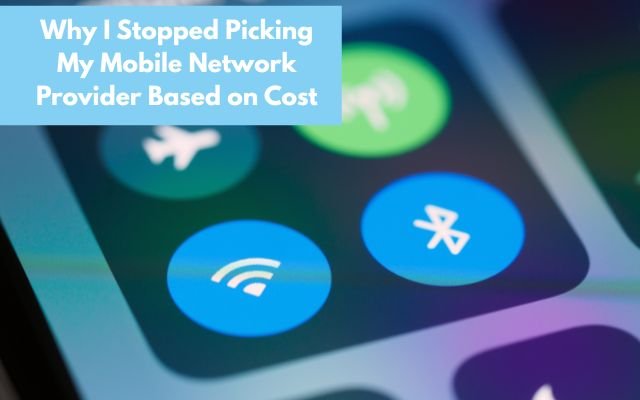Why I Stopped Picking My Mobile Network Provider Based on Cost
I stopped choosing mobile network providers based on price after facing slow internet, bad support, and call limits. Here's why service matters more.

I used to believe all mobile network providers were the same, whether expensive or budget-friendly. But after facing a few frustrating issues, I realized that cheaper isn’t always better. Budget providers may work well—until something goes wrong. Here’s why I no longer choose a mobile network based on price alone.
The Problem with Poor Customer Support
I never thought customer support varied so much between mobile providers until I had an issue. I couldn’t access my PayPal account, and their team said the problem was with my mobile network. So, I contacted my provider’s support team, expecting a quick fix.
Instead, it turned into a frustrating experience. They promised to call back within an hour but never did. When I followed up, they assured me again—but I never heard from them.
On the other hand, major network providers have always been more reliable. While I prefer to avoid contracts and pay for my phone upfront I’ve noticed that big providers offer better support when things go wrong.
The Drawbacks of Text and Call Limits
These days, SMS limits aren’t a huge issue since I mostly use iMessage, WhatsApp, and Instagram to stay in touch. But sometimes, I still need traditional texts—especially for friends who don’t use social media and have Android devices.
It is annoying to have a text limitations since it disrupts talks. I start thinking about how many texts I have left instead of just talking organically.
Call limits are even more restrictive. Since I live abroad, I often need to call internationally and while budget providers offer low rates, their limits can be tight. I’d rather have unlimited calls and texts without worrying about running out.
Poor Internet Connection Issues
Cheaper mobile networks rent bandwidth from major providers, which helps keep costs low. However, this often means slower speeds and lower priority during peak times.
When I tried a free network provider, I was limited to 4G instead of 5G. While this was fine in most cases it became frustrating when I traveled and needed to use my phone as a hotspot. The connection was too slow to be reliable.
Now, I’d rather pay more for priority access to ensure a better connection when I need it. If speed is crucial I’d also consider using a portable Wi-Fi device for faster data access.
Problems with Receiving Short Code Texts
I sometimes need short code texts for two-factor authentication (2FA) and status updates. However, my last budget network provider caused major issues.
For over a week, I didn’t receive PayPal’s verification codes making it impossible to access my account. When I contacted my provider, they had no solution. Frustrated, I switched to a better network to avoid the problem.
This experience also reminded me that SMS isn’t the safest option for 2FA. Using app-based authentication can help prevent these issues.
Limited Coverage in Other Countries
I travel frequently, so I need reliable mobile data when visiting different countries. Before each trip, I make sure my phone will work internationally—or at least have a backup plan.
Since I live in the EU, I automatically get coverage in EU/EEA countries. However, places like the UK and Switzerland aren’t always included especially with cheaper network providers.
In contrast, major network providers offer more flexibility. My current plan, for example: includes data access in over 50 countries, including the US.
Budget providers can be a suitable choice if you’re a student or don’t require comprehensive coverage. However, it’s usually worth it to spend more for superior service if you travel frequently.
- Tried Vertical Browser Tabs — Here’s What Sent Me Back to Horizontal
- 5 File Explorer Search Tricks That Make My Life Easier
- You Think You Know My Apple Intelligence Problem? Think Again.
FAQ: Why Cost Isn’t My Priority for a Mobile Network provider
Why don’t you pick mobile networks based on price anymore?
I found that low-cost companies frequently have issues including poor customer support, sluggish internet, and text and call limits. Better service comes with a higher price.
Are budget mobile providers always bad?
No, they can be good if you don’t need fast internet, travel often or rely on customer support. They work well for basic use.
Why do big network providers offer better service?
They own their networks, so they can give faster internet, better coverage, and helpful support. Budget providers rent space, so they may be slower.
What should I check before choosing a mobile provider?
Look into network coverage, text and call restrictions, internet speed, customer service, and whether or not short code texts are permitted for login codes and other information.
Is paying more for a mobile plan worth it?
If you travel, need fast internet, or want better support, then yes. But if you only need basic calls and texts, a cheap plan might be fine.



